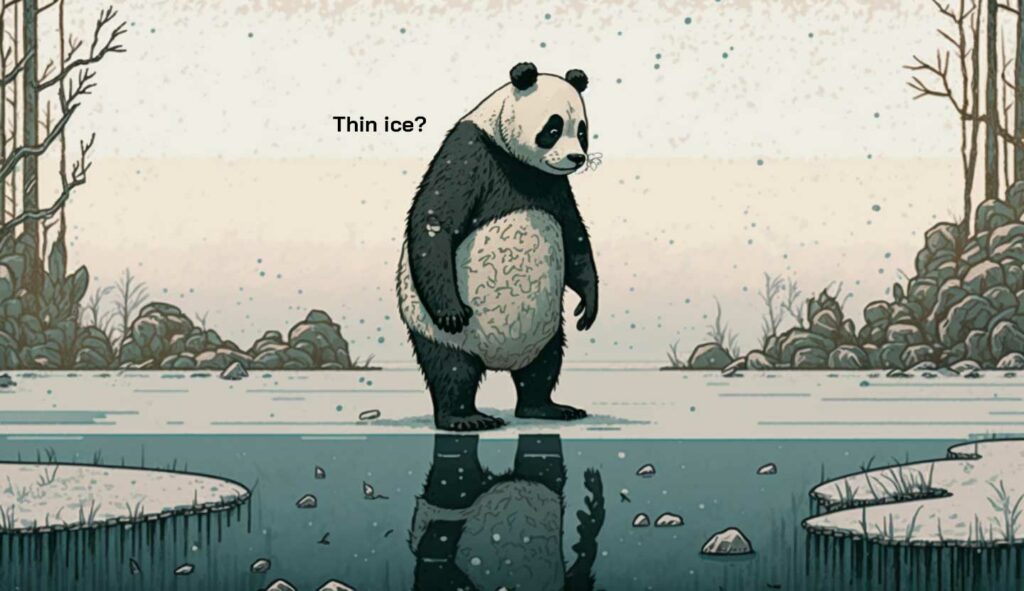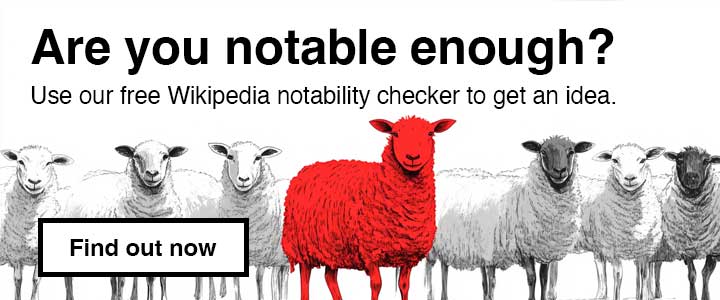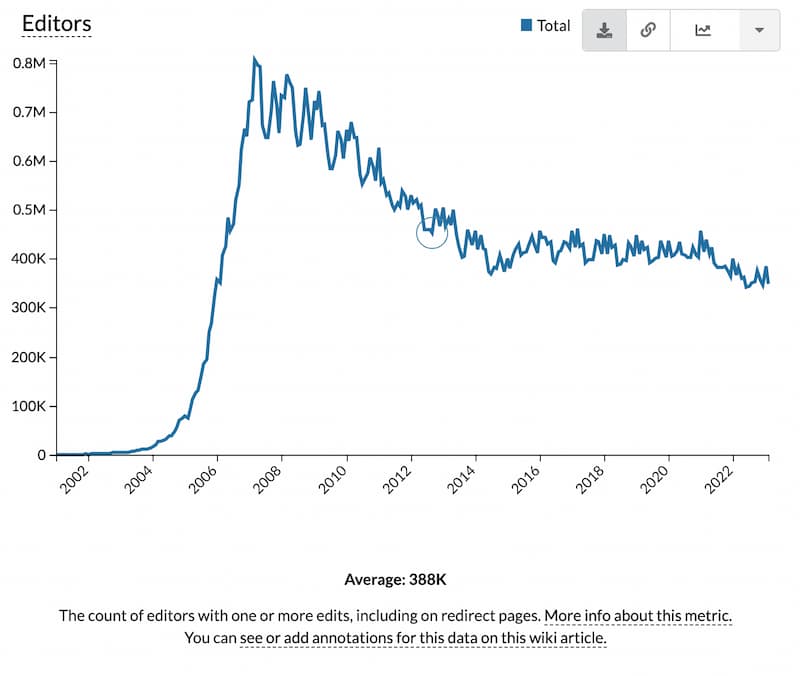Is Wikipedia a Reliable Source for Information?
- Wikipedia is on the first page of Google search results more than 50% of the time.
- Wikipedia articles have an accuracy rate of 80 percent compared with 95-96 percent accuracy of other sources.
- However, anyone can edit Wikipedia, and no expertise is needed. So, is Wikipedia trustworthy?
We all use Wikipedia. But how much should we trust what we read on Wikipedia?

Wikipedia is a great starting point for online research. It has a very good reputation and consistently ranks at the top of Google search results and has information on almost every topic. But is Wikipedia a reliable source? The answer as to whether it is trustworthy is both yes and no.
Sometimes, Wikipedia can be an accurate source of information. It is updated regularly and contains a wealth of knowledge from various sources (these are two of the main reasons it ranks so high in search). Articles that have many editors who are clearly experts and that include solid citations and references are usually quite reliable. Articles with less oversight tend to be less reliable.
“Wikipedia is not a reliable source…. As a user-generated source, it can be edited by anyone at any time, and any information it contains at a particular time could be vandalism, a work in progress, or simply incorrect.”
– Wikipedia
Wikipedia is an open-source encyclopedia. This means anyone can edit its pages, which leads to wild inconsistencies across its pages. With 45,175,790 registered Wikipedia users, there is always the potential for bias or inaccuracies.
Therefore, when reading information on Wikipedia, it’s important to take the time to verify the accuracy of the information by looking for other sources that corroborate the facts.

Why is Wikipedia not a reliable source?
Journalist Edwin Black characterized the content of Wikipedia articles as a mixture of “truth, half-truth, and some falsehoods.”
Wikipedia doesn’t require any credentials or experience to edit. This means anyone with an internet connection can edit and add content. Many Wikipedia editors are fueled by passion and hidden agendas, not a desire to create unbiased coverage.
3 Reasons why Wikipedia is not a reliable source:
- Wikipedia’s editing structure
- Lack of fact-checking
- Bias in coverage
Wikipedia’s editing structure
Wikipedia is edited by Wikipedians, who are volunteer editors.

This creates an opportunity for vigilante editors to attempt to control the information that exists on Wikipedia. We’ve seen cases where editors portray certain brands or people as they fit, regardless of the facts. Once a page gets on the radar of certain high-ranking editors (who often have their own agenda), maintaining a neutral page can be very difficult.
>>Click here to read why you shouldn’t edit your own Wikipedia page<<
Then there are the cases of people making one-off edits to pages. Operating under the guise of anonymity, rogue editors can attempt to add information to Wikipedia pages. We’ve seen anonymous editors write a damning sentence about a company and paste it into numerous other Wikipedia pages that simply mention the brand. While these types of edits can get flagged as vandalism and reverted, there are cases where they stick and become difficult to remove from the page.

Lack of fact-checking
Unlike traditional news sources, Wikipedia lacks an official fact-checking structure. Once an editor adds a sentence or source to a Wikipedia article, it will remain there until someone comes along and challenges it, regardless of its accuracy. Some pages are closely monitored and protected. Since Wikipedia does not subject its content to the same rigorous review process as traditional news sources, errors and omissions can go unnoticed. Depending on who is editing the page, some Wikipedia pages will be more accurate than others.
Bias in coverage
Just like with any media coverage, Wikipedia has its own bias. Depending on the editors’ interests, some Wikipedia pages are short and surface-level, while others are in-depth and well-sourced.
Stephen Colbert coined the term “Wikiality” on The Colbert Report, which is the idea that if you claim something to be true and enough people agree with you, it becomes true. There is a herd mentality that takes over Wikipedia editing, and editors can transfer their personal biases onto Wikipedia pages.
Wikipedia has been criticized for a range of biases, including:
- Gender bias and sexism
- Partisanship
- Corporate bias
- Scientific disputes
- Racial bias
Who owns Wikipedia?
Larry Sanger and Jimmy Wales launched Wikipedia on January 15, 2001. In mid-2003, Wales set up the Wikimedia Foundation (WMF), a 501(c)(3) non-profit organization that owns Wikipedia today. Wales is a Wikimedia Foundation’s Board of Trustees member and was its official chairman from 2003 through 2006.
The Wikimedia Foundation is based in San Francisco and is supported by donations and grants. It operates under the mission “to bring free knowledge to everyone.”
Is Britannica a more reliable source?
Britannica is considered a more reliable source than Wikipedia, especially when citing facts and figures. This is because Britannica articles are written by experts in the field, whereas anyone can write Wikipedia articles.
Britannica also employs a rigorous editorial process and reviews every article for accuracy and completeness before publication.
The debate between Wikipedia and Britannica has been going on for years and has been the subject of many studies. One study found that in almost all cases, Wikipedia was more left-leaning than Britannica.
The researchers divided articles into categories and found that:
- Articles on corporations were 11 percent more slanted toward Democrats
- Government articles were 9 percent more slanted toward Democrats
- Articles on education were 4 percent more slanted toward Democrats
- Articles on immigration were 4 percent more slanted toward Democrats
- Articles on civil rights were 3 percent more slanted toward Democrats
However, biases exist everywhere, and the answer to this question really depends on context. Wikipedia articles are much longer than Britannica articles. When you look at the first 100 words of a Wikipedia article, it will usually be just as factual as Britannica. The facts begin to dilute when you get down into the depths of some Wikipedia articles.
Is ChatGPT a reliable source?
ChatGPT is an online chatbot service that can help you find answers to questions about various topics. It was launched by OpenAI, an AI and research company, on November 30, 2022.
It is the fastest-growing app of all time. In January, only two months after its launch, UBS analysis estimated that ChatGPT had 100 million active users. For comparison, it took nine months for TikTok to reach 100 million.
It is designed to provide a conversational experience, allowing users to ask questions and receive answers. While it is not an authoritative source of information, ChatGPT can be a useful tool for quickly finding answers to simple questions, and it can provide answers from sources like Wikipedia and Britannica.
It is important to note, however, that ChatGPT does not always provide accurate and up-to-date information, so it should not be relied upon for important decisions. Additionally, ChatGPT does not have a human moderator, so inappropriate content may not be filtered out.
And sometimes, ChatGPT will provide false information written in the same definitive tone as the truth. For example, see the below example of a question that ChatGPT answered incorrectly.

Five of the six answers above are incorrect, but ChatGPT wrote the answer as confidently as if it were true. This is a basic example, but you can imagine how this tool may fare on more complex or controversial topics.
Overall, ChatGPT can be a useful tool for quickly finding answers to simple questions, but it should not be used as an authoritative source of information.
Wikipedia be trusted?
The short answer to this question is that Wikipedia can usually be trusted. As with most sources, everything read on Wikipedia must be processed through a critical lens.
Journalists and academics often use Wikipedia; however, it is rarely, if ever, used as a sole source of information. Additionally, each article includes a list of citations and references that can be used to further verify the accuracy of the information. Of course, it is always wise to double-check the information you find on Wikipedia. But, overall, it can be trusted as a reliable source of information.
To ensure you form an accurate opinion through online research, it is important to use multiple sources, including Britannica and Wikipedia. And maybe save ChatGPT for super quick searches or just for fun.
About the author
Brianne Schaer is a Writer and Editor for Reputation X, an award-winning online reputation management services agency based in California. Brianne has more than seven years of experience creating powerful stories, how-to documentation, SEO articles, and Wikipedia content for brands and individuals. When she’s not battling AI content bots, she is cruising around town in her Karmann Ghia. You can see more of her articles here and here.
–
Tags: Wikipedia.
